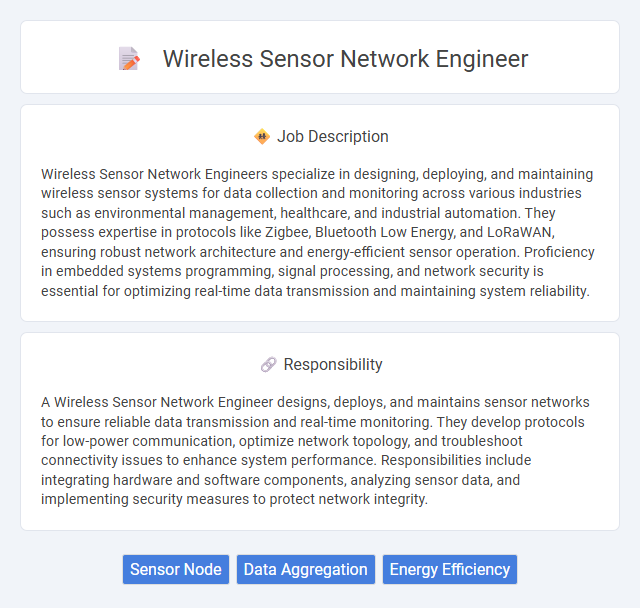
Wireless Sensor Network Engineers specialize in designing, deploying, and maintaining wireless sensor systems for data collection and monitoring across various industries such as environmental management, healthcare, and industrial automation. They possess expertise in protocols like Zigbee, Bluetooth Low Energy, and LoRaWAN, ensuring robust network architecture and energy-efficient sensor operation. Proficiency in embedded systems programming, signal processing, and network security is essential for optimizing real-time data transmission and maintaining system reliability.
Individuals with a strong analytical mindset and a passion for technology are likely well-suited for a Wireless Sensor Network Engineer role. Those comfortable with hands-on problem-solving and working in dynamic environments may find satisfaction in designing and maintaining complex sensor systems. However, individuals who prefer routine tasks or minimal collaboration might face challenges adapting to this specialized and often evolving field.
Qualification
Wireless Sensor Network Engineers require strong expertise in embedded systems, signal processing, and network protocols such as Zigbee, Bluetooth, and LoRaWAN. Proficiency in programming languages like C, C++, and Python is crucial, alongside knowledge of hardware components and IoT platforms. A background in electrical engineering, computer science, or related fields, combined with experience in sensor integration and data analytics, significantly enhances job performance.
Responsibility
A Wireless Sensor Network Engineer designs, deploys, and maintains sensor networks to ensure reliable data transmission and real-time monitoring. They develop protocols for low-power communication, optimize network topology, and troubleshoot connectivity issues to enhance system performance. Responsibilities include integrating hardware and software components, analyzing sensor data, and implementing security measures to protect network integrity.
Benefit
Wireless Sensor Network Engineer roles likely offer benefits such as opportunities to work with cutting-edge IoT technologies and contribute to innovative projects in smart environments. Employees probably enjoy competitive salaries, along with professional development options to enhance expertise in wireless communication protocols and sensor integration. Job stability and the chance to impact industries like healthcare, agriculture, and manufacturing could also be key advantages.
Challenge
A Wireless Sensor Network Engineer likely faces challenges related to optimizing network performance in environments with limited power and bandwidth. They probably need to address issues such as signal interference, data reliability, and secure communication protocols. The role could demand continuous adaptation to emerging wireless technologies and evolving industry standards.
Career Advancement
Wireless Sensor Network Engineers specializing in advanced IoT technologies and edge computing can accelerate career growth by mastering network security protocols and data analytics. Expertise in designing scalable sensor architectures and integrating AI-driven monitoring systems significantly increases demand in smart city and industrial automation sectors. Certifications in wireless communication standards and hands-on experience with real-time data processing position professionals for leadership roles in R&D and project management.
Key Terms
Sensor Node
Sensor Node design in Wireless Sensor Network Engineering centers on optimizing energy efficiency, data accuracy, and wireless communication protocols to ensure reliable performance in diverse environments. Engineers leverage low-power microcontrollers, embedded sensors, and robust RF transceivers to enable real-time data acquisition and transmission. Advanced techniques such as adaptive duty cycling, mesh networking, and sensor fusion are implemented to enhance network longevity and resilience.
Data Aggregation
Wireless Sensor Network Engineers specialize in designing and optimizing data aggregation techniques to enhance the efficiency of sensor nodes within distributed networks. They implement algorithms that minimize data redundancy and energy consumption while ensuring accurate and timely data collection across multiple sensor nodes. Expertise in protocol development, signal processing, and network topology optimization is essential for improving data aggregation reliability and network lifespan.
Energy Efficiency
Wireless Sensor Network Engineers specialize in designing and implementing energy-efficient communication protocols and hardware to maximize battery life and reduce power consumption in sensor nodes. They optimize network topology and data transmission strategies to enhance energy harvesting and manage energy resources efficiently in large-scale sensor deployments. Expertise in low-power wireless technologies such as Zigbee, LoRa, and Bluetooth Low Energy is critical to sustaining prolonged network operations in remote or inaccessible environments.
 kuljobs.com
kuljobs.com